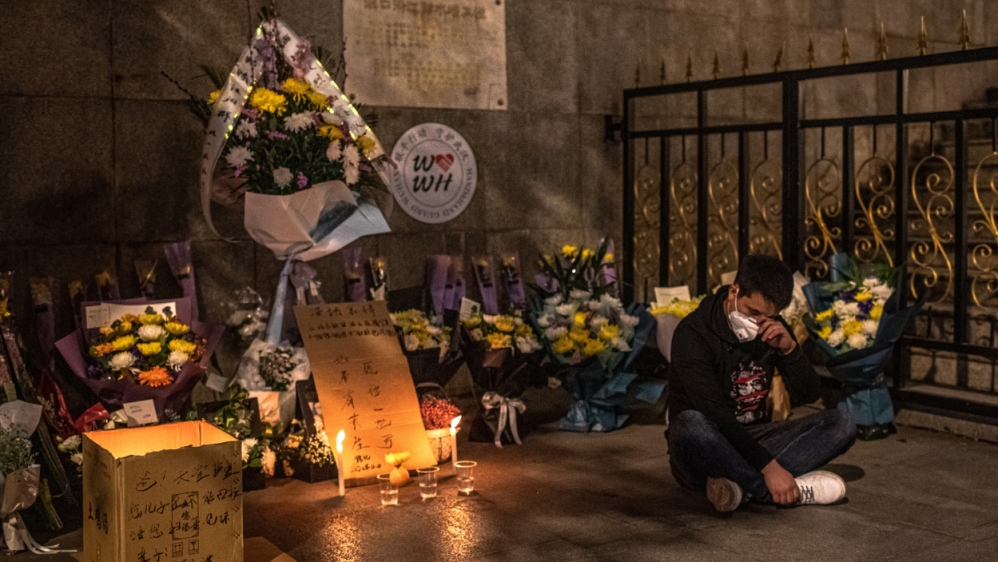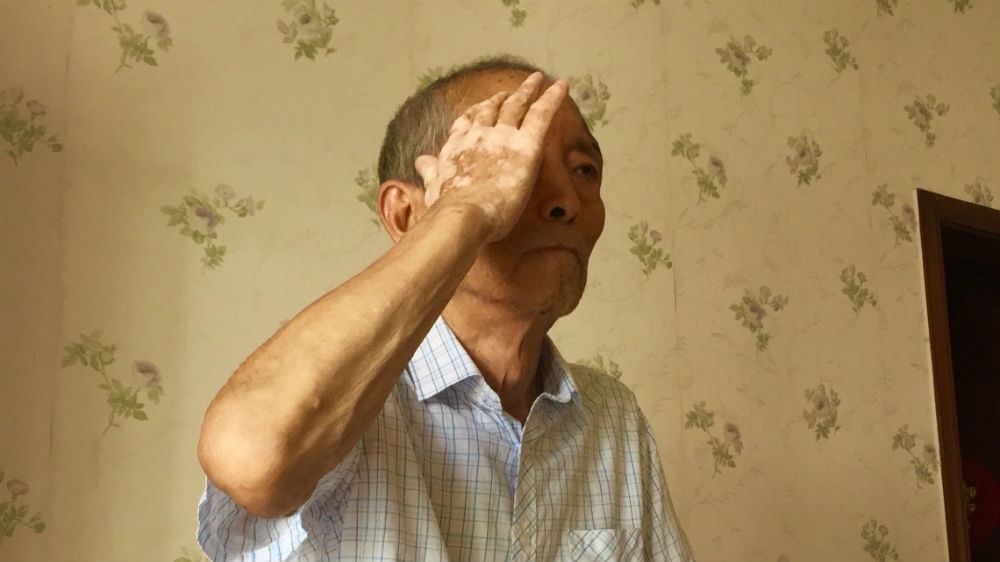In China, a son blames Wuhan for father’s coronavirus death
Army veteran Zhang Lifa went to a Wuhan hospital in January after breaking his leg. On February 1, he died of COVID-19.

Shenzhen, China – Zhang Hai is one of the thousands in China unable to hold a proper funeral for his father when he died from the novel coronavirus. But his sadness is mixed with anger because he blames the authorities in Wuhan for their mishandling of the situation.
Zhang Hai’s 76-year-old father Zhang Lifa died of the disease, also known as COVID-19 on February 1 at a hospital in the city where 3,868 others have officially died of the disease.
Keep reading
list of 3 items‘Come clean’: US presses China on coronavirus after lab reports
The origin of the coronavirus: Few leads, many theories
It was in Wuhan where the first cases of the mysterious new pneumonia that became a global pandemic first emerged late last year.
Now back home in Shenzhen, Zhang Hai is demanding answers and accountability from local officials over his father’s death.
“I blame the Wuhan government for their lies and cover-ups, but I have my full support for the central government, which was lied to twice by the Wuhan officials when they sent two teams to Wuhan to investigate,” Zhang Hai said.
|
|
“As soon as the central government realised the magnitude of the outbreak, they acted swiftly and transparently and have done a good job containing the outbreak.”
About 11 million people were locked down in Wuhan on January 23, when the central government sealed off the city.
What concerns Zhang Hai is that in the weeks before that lockdown very little was being said about the outbreak and few people were being warned to stay away from Wuhan, where his father had been living for more than 20 years.
‘Unusual pneumonia’
On December 31, 2019, the Wuhan Municipal Health Commission first officially notified the World Health Organization (WHO) about a cluster of unusual pneumonia-like cases in Wuhan.
On January 14, the WHO said it was seeing the first human-to-human transmissions of these cases and warned that the risk of a wider outbreak was possible. It also said that more human-to-human transmission could be on the rise based on past experience with SARS, MERS and other respiratory illnesses.
The Wuhan Health Commission, meanwhile, issued a statement the following day saying it did not have clear evidence of human-to-human transmission – and that although the possibility could not be ruled out, the risk was still low.

Zhang ‘s father had been living in Wuhan, but after a fall last year and the onset of dementia, he had brought him to Shenzhen.
On January 15, Zhang Lifa fell again, breaking his leg; an injury that required hospitalisation.
By this time, Zhang Hai had left his job to care for his father and was running short on funds.
People’s Liberation Army veteran
Zhang Lifa had served as a People’s Liberation Army (PLA) soldier and worked on nuclear bomb development and testing in the 1960s. This had left him deaf in one ear and in poor health as he was exposed to radiation. His service and health conditions meant that he could claim disabled veteran benefits and free medical treatment in Wuhan.
Going to a hospital in the city at that time seemed like a sensible idea.
“At the time I quit my job to better look after my father so the financial burden as a result of his treatment was pretty heavy,” Zhang Hai said during an interview in Shenzhen where he returned to earlier this month when the Wuhan lockdown was lifted. “So I decided to take him back to Wuhan, where he could enjoy free treatment as a local resident. We didn’t know about the outbreak.”

The pair drove straight from Shenzhen to Wuhan and directly to the hospital on January 17. His father had surgery three days later and woke up from sedation three days after that.
“The surgery had been very successful and he was in good condition,” Zhang Hai said. “But soon, he began to have fevers frequently and before long his condition worsened and he went into a coma.”
Zhang Hai says that had he been aware of the emergence of the virus then, he would not have risked taking his sickly father back to Wuhan.
“I didn’t know anything about it when I went back,” he said of the virus. “If the Wuhan government had been transparent, then perhaps all of this wouldn’t have happened and thousands of lives would have been saved.
‘My heart sank’
“I have nothing against the Party, this country or the central government – in fact, I’m a die-hard supporter – I’m only speaking for myself and hope that the Wuhan officials who had a part in telling lies to the public get what they deserve,” he said.
On January 29, medical staff suspected Zhang Lifa had contracted the virus and although testing kits were scarce at the time, one was procured for him.
“It was inside the hospital that my father was infected, I’m sure,” Zhang Hai said. “The surgery went very well and he would have been fine. So I blame this on the Wuhan government. It’s because of their initial cover-ups, lack of transparency and lies that led to the tragedy.”
|
|
The next day Zhang Hai was told his father had COVID-19.
“My heart sank after hearing that,” Zhang Hai said. “Up till that time my father had been in the orthopaedics department, and I was allowed to be with him but on February 1, the medical staff told me that I should get his things in order. So I decided to go out and buy him some new clothes.”
By the time Zhang Hai returned to the hospital his father had been relocated to a COVID-19 ward, and while he was allowed into that ward later, a nurse told him that his father had passed away before he had a chance to see him one last time.
‘Unacceptable’
About 10pm that evening workers came to collct his father’s body to take to a local funeral home because of a (policy mandating immediate cremation for COVID-19 victims.
Compounding the upset, Zhang Hai said he had not been able to collect his father’s ashes because of a rule requiring a representative of the deceased person’s work unit accompany family members – in this case, the college where his father previously worked.
“You can’t do that by yourself,” Zhang Hai said, explaining why he had been unable to collect the urn.
“It’s my family’s business, why would I want an outsider to be a part of it? Where were they when my father was suffering in the hospital? I think this is extremely unacceptable.
|
|
But this is the policy for everyone now, as I have learned from a government worker, if the deceased person has an organisation he was associated with, then their family members should be accompanied by a representative; if not, they will be accompanied by a representative from their neighbourhood’s committee. This is all unacceptable.”
Asked what his favourite memory of his father Zhang Lifa was, the younger Zhang said it was a fairly recent one.
On October 1 last year when the country was celebrating the 70th anniversary of the People’s Republic of China with a nationally televised parade, his father got to his feet to salute the flag during the playing of the March of the Volunteers, the country’s national anthem.
“The most important thing I learned from him is that he taught me to maintain my moral integrity, to always show love to others and to treasure life,” Zhang Hai said.
“That’s why for a short time I volunteered to help families with infected members to get to hospitals at the height of the crisis [after my father died], even though I knew I could put myself in danger.”